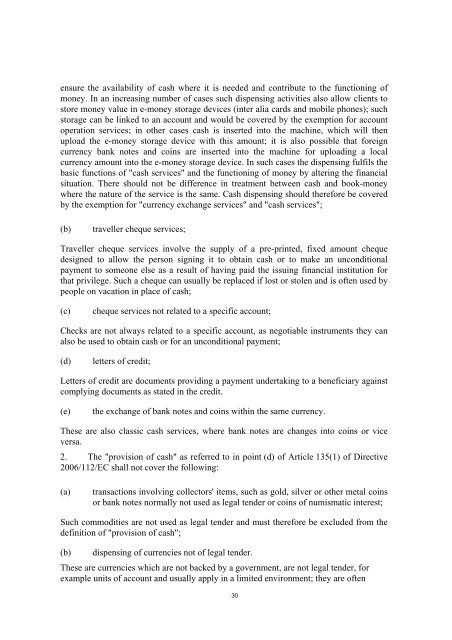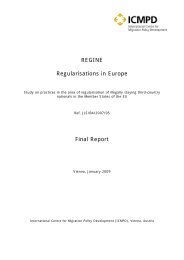taxud/2414/08 - European Commission - Europa
taxud/2414/08 - European Commission - Europa
taxud/2414/08 - European Commission - Europa
Create successful ePaper yourself
Turn your PDF publications into a flip-book with our unique Google optimized e-Paper software.
ensure the availability of cash where it is needed and contribute to the functioning of<br />
money. In an increasing number of cases such dispensing activities also allow clients to<br />
store money value in e-money storage devices (inter alia cards and mobile phones); such<br />
storage can be linked to an account and would be covered by the exemption for account<br />
operation services; in other cases cash is inserted into the machine, which will then<br />
upload the e-money storage device with this amount; it is also possible that foreign<br />
currency bank notes and coins are inserted into the machine for uploading a local<br />
currency amount into the e-money storage device. In such cases the dispensing fulfils the<br />
basic functions of "cash services" and the functioning of money by altering the financial<br />
situation. There should not be difference in treatment between cash and book-money<br />
where the nature of the service is the same. Cash dispensing should therefore be covered<br />
by the exemption for "currency exchange services" and "cash services";<br />
(b)<br />
traveller cheque services;<br />
Traveller cheque services involve the supply of a pre-printed, fixed amount cheque<br />
designed to allow the person signing it to obtain cash or to make an unconditional<br />
payment to someone else as a result of having paid the issuing financial institution for<br />
that privilege. Such a cheque can usually be replaced if lost or stolen and is often used by<br />
people on vacation in place of cash;<br />
(c)<br />
cheque services not related to a specific account;<br />
Checks are not always related to a specific account, as negotiable instruments they can<br />
also be used to obtain cash or for an unconditional payment;<br />
(d)<br />
letters of credit;<br />
Letters of credit are documents providing a payment undertaking to a beneficiary against<br />
complying documents as stated in the credit.<br />
(e)<br />
the exchange of bank notes and coins within the same currency.<br />
These are also classic cash services, where bank notes are changes into coins or vice<br />
versa.<br />
2. The "provision of cash" as referred to in point (d) of Article 135(1) of Directive<br />
2006/112/EC shall not cover the following:<br />
(a)<br />
transactions involving collectors' items, such as gold, silver or other metal coins<br />
or bank notes normally not used as legal tender or coins of numismatic interest;<br />
Such commodities are not used as legal tender and must therefore be excluded from the<br />
definition of "provision of cash";<br />
(b)<br />
dispensing of currencies not of legal tender.<br />
These are currencies which are not backed by a government, are not legal tender, for<br />
example units of account and usually apply in a limited environment; they are often<br />
30
















